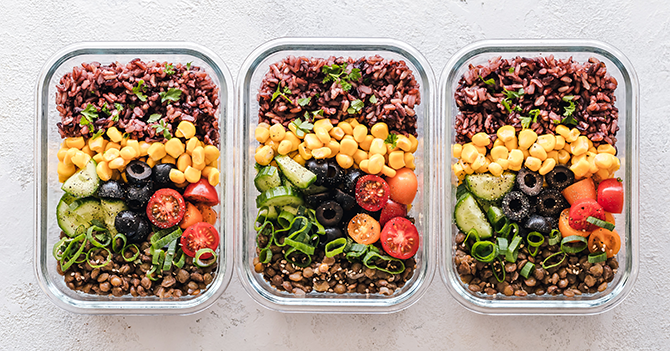The Top 5 BBQ Sauces Every Plant-Based Chef Should Stock
The Top 5 BBQ Sauces Every Plant-Based Chef Should Stock
Blog Article
Everything About Healthy And Balanced Food: Benefits of Taking On Plant Based Options
The conversation bordering plant-based diet plans has acquired considerable focus recently. Lots of individuals are checking out the possible health benefits, dietary benefits, and ecological impacts linked with these dietary choices. As individuals become extra knowledgeable about their food's impact on well-being and sustainability, concerns occur regarding the practicalities of adopting such a way of living. What specific adjustments can one anticipate, and how might these options improve not just individual wellness but likewise the earth's future?
Recognizing Plant-Based Diets
Numerous people link plant-based diet plans primarily with vegetarianism or veganism, these diets can incorporate a vast range of eating patterns that focus on whole, minimally refined plant foods. Such diet plans often include fruits, veggies, whole grains, legumes, nuts, and seeds, while removing or limiting pet products. This adaptability enables individuals to customize their nutritional choices according to personal choices and dietary requirements. Some might embrace a mainly plant-based diet while still sometimes consuming meat or milk, commonly referred to as a flexitarian technique. The emphasis remains on incorporating more plant foods, which can lead to a diverse array of dishes and tastes. Comprehending these different analyses of plant-based eating is important for valuing its accessibility and appeal in contemporary food society.
Health Conveniences of Plant-Based Foods
The health and wellness advantages of plant-based foods are substantial, using a nutrient density benefit that sustains general wellness. Study indicates that these foods can boost heart wellness and play an important role in effective weight management. By including much more plant-based choices, people may improve their dietary choices and promote lasting health and wellness.
Nutrient Thickness Advantage
Nutrient density plays a crucial duty in the health benefits of plant-based foods, making them an engaging option for those looking for a balanced diet plan. Plant-based foods, such as fruits, veggies, legumes, nuts, and whole grains, are frequently abundant in vital vitamins, minerals, and antioxidants while being lower in calories. This high nutrient thickness allows people to take in fewer calories while still satisfying their dietary demands. In addition, these foods are loaded with dietary fiber, advertising digestive system health and wellness and assisting in weight monitoring. By integrating nutrient-dense plant-based options, consumers can enhance their overall health, support their body immune systems, and lower the risk of persistent diseases. Inevitably, the nutrient thickness of plant-based foods highlights their value in a health-conscious way of life.
Heart Health And Wellness Improvement

Weight Monitoring Support
Along with promoting heart health, a plant-based diet plan can significantly aid in weight management. This dietary method highlights entire foods such as fruits, veggies, vegetables, nuts, and whole grains, which are usually reduced in calories and higher in fiber contrasted to animal-based items. The high fiber content aids increase satiety, minimizing general calorie intake. Additionally, plant-based diet plans are usually abundant in vital nutrients while low in unhealthy fats, making it simpler to keep a healthy and balanced weight. Plant Based Chicken. Research suggests that individuals that adopt a plant-based lifestyle have a tendency to have lower body mass indexes (BMIs) and experience more effective weight loss contrasted to those who consume meat-heavy diet regimens. Consequently, welcoming plant-based options is a tactical choice for effective weight management
Nutritional Worth of Plant-Based Ingredients
Plant-based active ingredients are rich in important nutrients, offering a varied range of vitamins, minerals, and anti-oxidants that add to general wellness. A comparison of healthy protein resources exposes that while animal items are typically considered as superior, several plant-based choices provide appropriate healthy protein and other valuable substances. Comprehending the nutritional value of these active ingredients can assist people make notified nutritional choices.
Important Nutrients in Plants
Nutrient-rich ingredients located in plants offer a diverse selection of important nutrients that add substantially to total health and wellness. These components are rich in great post to read vitamins A, C, and K, which sustain immune feature, vision, and blood clotting, respectively. Furthermore, plants provide crucial minerals such as potassium, magnesium, and calcium, crucial for heart health and wellness, muscular tissue feature, and bone stamina. The existence of fiber in plant-based foods help digestion and promotes a healthy intestine microbiome. Antioxidants, found generously in fruits and vegetables, help fight oxidative anxiety and decrease swelling. In addition, many plant foods are low in calories yet high in nutrients, making them an exceptional option for those seeking to keep a healthy and balanced weight while ensuring perfect nutrient intake.
Contrasting Protein Sources
Protein sources differ substantially in their nutritional accounts, with plant-based ingredients using special advantages. Unlike animal proteins, which frequently have hydrogenated fats and cholesterol, plant proteins often tend to be lower in these undesirable parts. Legumes, nuts, seeds, and whole grains are rich in important click now amino acids, fiber, vitamins, and minerals. For instance, lentils give high protein material along with considerable iron and folate, while quinoa is a complete healthy protein, providing all nine vital amino acids. In addition, plant-based proteins are commonly gone along with by antioxidants and phytochemicals that support overall wellness. The change to plant-based healthy protein resources not just enhances nutritional intake however additionally aligns with sustainable dietary practices, decreasing ecological effect and promoting long-term health benefits.
Ecological Effect of Plant-Based Consuming
As understanding of climate modification expands, numerous individuals are discovering lasting nutritional options that can significantly reduce their ecological impact. Plant-based consuming has become a substantial contributor to minimizing greenhouse gas discharges, which are primarily related to livestock manufacturing. The farming of fruits, veggies, grains, and vegetables typically requires less sources, such as water and land, contrasted to animal farming. Furthermore, plant-based diet regimens can lead to lowered logging, as much less land is required for grazing livestock or growing animal feed. By changing in the direction of plant-based options, customers can sustain biodiversity and advertise much healthier environments. Generally, welcoming plant-based consuming not only advantages individual health and wellness but also represents an essential action toward environmental sustainability and conservation initiatives.
Conquering Common Misconceptions
While several people identify the benefits of a plant-based diet, numerous misconceptions commonly discourage them from fully accepting this lifestyle. A typical belief is that plant-based diets lack adequate protein; nonetheless, numerous plant sources, such as beans, nuts, and tofu, give sufficient protein. In addition, some think that this diet regimen is pricey, when actually, staples like beans, rice, and seasonal veggies can be rather affordable. An additional mistaken belief is that plant-based eating is extremely limiting, whereas it in fact uses a varied array of tastes and foods. Lastly, numerous worry that a plant-based diet may result in shortages, yet with correct preparation, people can get all essential useful site nutrients, including nutrients, while delighting in a wide range of scrumptious dishes.
Tips for Transitioning to a Plant-Based Lifestyle
Making the shift to a plant-based lifestyle can be an enriching experience, though it usually needs some guidance to navigate the preliminary modifications. Initially, people are motivated to begin gradually, incorporating even more fruits, vegetables, beans, and entire grains right into their dishes while lowering meat and dairy products usage. Dish preparation is crucial; preparing a weekly menu can assist ease the change and avoid final undesirable selections. Checking out brand-new dishes and cooking techniques can likewise maintain and improve the experience enjoyment about plant-based eating. Additionally, signing up with support system or areas can give motivation and share useful suggestions. Remaining notified about nourishment warranties balanced meals, avoiding shortages while promoting a healthy, satisfying plant-based way of life.

Delicious Plant-Based Meal Concepts
Exploring scrumptious plant-based meal concepts can motivate people to welcome an extra nourishing diet regimen. One popular choice is a passionate quinoa salad, including cherry tomatoes, cucumber, and a spicy lemon-tahini clothing. An additional favorite is a mouthwatering lentil stew, packed with carrots, celery, and great smelling herbs, perfect for a soothing dinner. For breakfast, overnight oats made with almond milk, chia seeds, and covered with fresh berries provide a nourishing start to the day. Additionally, a dynamic vegetable stir-fry with tofu and a range of vibrant veggies can be a quick yet pleasing dish. Luscious avocado toast on whole-grain bread, sprinkled with spices and seeds, uses a straightforward yet tasty treat. These dishes display the variety and splendor of plant-based eating.

Frequently Asked Questions
Can a Plant-Based Diet Give Enough Healthy Protein?
The inquiry of whether a plant-based diet regimen can supply enough protein is common. Countless resources, consisting of vegetables, nuts, seeds, and whole grains, can fulfill healthy protein needs effectively, supporting a well balanced and nutritious diet plan for people.
Are Plant-Based Diets Appropriate for Kid?
The suitability of plant-based diets for children depends on cautious preparation. Ample nutrients have to be assured, including vitamins, healthy proteins, and minerals. With correct assistance, such diet regimens can support healthy and balanced growth and development in kids.
Just how Do I Eat in restaurants on a Plant-Based Diet?
Eating in restaurants on a plant-based diet involves seeking dining establishments with diverse menus, requesting for modifications, and checking out vegan-friendly choices. Preparation ahead and interacting nutritional choices can enhance the dining experience while maintaining nutritional choices.
What Are Usual Irritants in Plant-Based Foods?
Usual allergens in plant-based foods consist of soy, gluten, nuts, and seeds - Plant Based Beef. Individuals adhering to a plant-based diet plan should recognize these irritants and review tags very carefully to prevent unfavorable reactions and assure safe usage
Can Plant-Based Diets Assist With Weight-loss?
Study shows that taking on a plant-based diet might promote weight-loss as a result of its commonly reduced calorie density and higher fiber material. This mix can boost satiety, helping people handle their calorie intake successfully. Lots of individuals associate plant-based diets mainly with vegetarianism or veganism, these diet plans can incorporate a large variety of consuming patterns that focus on entire, minimally refined plant foods. Nutrient thickness plays a crucial duty in the wellness benefits of plant-based foods, making them a compelling choice for those looking for a well balanced diet. Plant-based diet plans have been revealed to substantially enhance heart wellness, as they often contain components that sustain cardiovascular feature. In enhancement to advertising heart health, a plant-based diet plan can considerably assist in weight administration. A typical belief is that plant-based diet regimens do not have adequate healthy protein; nonetheless, numerous plant resources, such as legumes, nuts, and tofu, provide enough protein.
Report this page